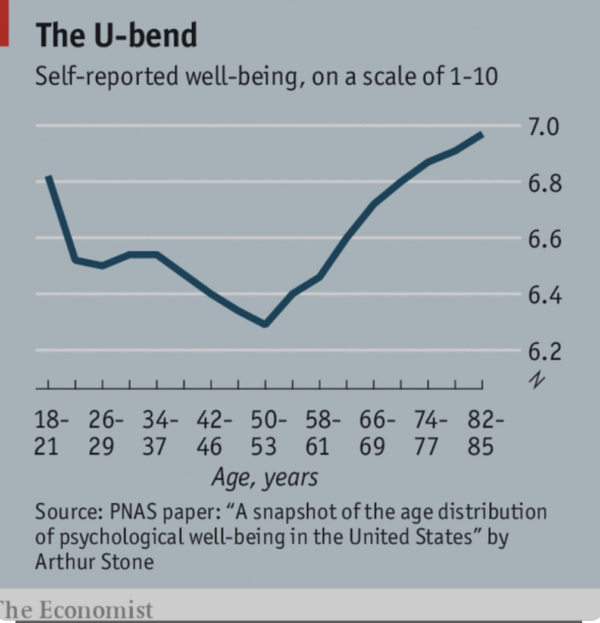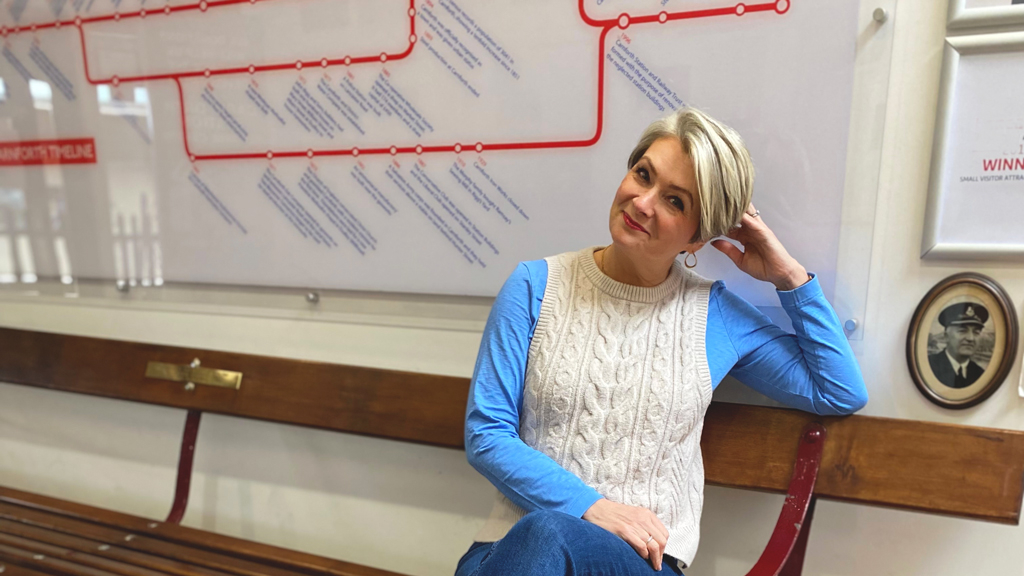I’m going to carry on addressing some of the issues you shared with me in last October’s survey today. For everyone who’s asking, I will talk about style and run the retailer spotlights again but not at the moment when the shops are short on inspiration and we’re all wrapped up against the snow. So today is all about the difficult parts of midlife that nobody prepares you for – the rough comes with the smooth – and how to handle it.
Midlife – the rough comes with smooth – how to handle it
The readership age of Midlifechic is weighted between 35 and 90 (although the 20s sector is currently the fastest growing and I had three survey respondents in their 90s – both discoveries absolutely delight me). It strikes me that overall we’re a bunch of (mostly) women who are well equipped to look after each other and share advice. Obviously everyone’s midlife comes with its individual challenges but I had a number of people in their late 40s/early 50s just heading into the thick of it who had questions about what might lie ahead. One suggested that the pitfalls of midlife in particular are so rarely discussed that a road map would be useful.
So that’s what I’m going to sketch out today but of course I can only give you my perspective, these are the biggest hurdles that I’ve faced. I’m just one person though and so I’m looking forward to hearing what you have to add in the comments – that’s when we’ll start to have a full picture of the way that in midlife – the rough comes with the smooth. The thing is that we’re told that we enter midlife at the bottom of life’s U curve – see this graphic from The Economist…

… and that leads us to feel that we should be on nothing but an upward trajectory by our mid-50s. There is so much about midlife that’s good – for me that’s included a feeling of knowing who I am, what I care about and what I want to stand for; the confidence to get rid of a lot of the dead wood that held me back (by that I mean thought patterns and people pleasing) along with the time to work out what I really enjoy versus what I think I should – and that, in itself, has led to a lot more fun.
However the most useful piece of advice that somebody could have given me six years ago is that midlife isn’t always the sunny upland that you’re led to believe it will be. Although on your 50th birthday you suddenly start being bombarded from every angle with adverts showing fit looking silver haired couples holding hands, gazing towards their future with anticipation it isn’t all like that. There are certainly stretches of it and I’ve enjoyed periods of technicolour euphoria when I’ve felt carefree for the first time in decades and gone a bit wild with the joy of it all. But we aren’t released overnight from life’s unpredictable pressures so with the request for a bit of a route map in mind, I’m going to map the hazards that have appeared in my path to date and give a few suggestions for handling them.
The arbitrariness of serious illnesses
I’m going to start with the one that hit me hardest last year so that we can get it over with. Without doubt the biggest shock for me so far has been seeing healthy midlife friends and acquaintances suddenly being hit by serious illnesses. Over the last couple of years I’ve felt as if I’ve been in a big game of rounders, happily playing along with all of the people I’ve known for years when all of a sudden key team players have been caught out and that’s it – the match is over for them. And the rest of us are left to keep on going round, hitting the ball as hard as we can in the hope that we’ll get to the next base.
I wish I’d known this before. I have lifelong friends that have gone and I wish I hadn’t taken them for granted, assuming that when we hit the empty nest we’d pick up again where we left off in our late 20s and have a ball. I was saying to a much older friend in the village over Christmas that it had been the very worst part of 2023 for me. She told me that she’d found that there seemed to be a picking off in her 50s – those who made it through often stayed well until their late 70s.
How to handle it
I don’t have the ultimate answer for this because I’m still a bit shocked by the last couple of years however this much I know.
- Midlife is a time for thinking carefully about friendship – it’s a blog post in itself – but by the time you reach your mid-50s you’ve accumulated all kinds of people who bring different things to your life. They all matter but you have to work out how to prioritise them and it might be that it’s time to bring forward some of those who, usually through distance or lack of time, have been outliers for a while. You might find that you’ve had friends of circumstance through your 30s and 40s, particularly if you have children. You often spend the school years with people whose lives are running parallel to yours. When you no longer have everyday parenting in common it might be that you find the glue that held you together has gone and only habit is left. It can be the same with work colleagues too. So it’s time to think about exactly who either lights you up or makes you feel warm and re-establish your bond while you can. Never assume that old friends will just always be there in the background. Midlife is a great time for making new friends as well but that’s another topic.
- Be there for the friends who are living with illness and their families too. Make it clear that you’ll stand by on whatever terms they want you to. With friends who are at a distance I’ve found that often they want someone they can be honest with when they need to be – someone they can rage at and share their disappointment with while they’re busy putting on a brave face for the people who are nearby. It’s hard to resist the reflex to try to fix things for them, to try to cheer them up when really they just need someone who will listen to the difficult things that they need to express. Giving them that release can be the most helpful thing you’re able to do.
- Share memories with them, dig out old photos. A couple of friends have told me that when they were isolated through chemo they felt their life had stopped and so going back and reliving things was an escape that opened the world up to them again. It will help you too if you lose them because you’ll have the comfort of knowing that you were able to show them how important they’d been to you. And that matters.
- When they’ve gone, the last thing you can do for them is live your life more fully than ever before. I hold with me the message from a friend’s husband who was dying – he said his regret was assuming they had so much time ahead. They’d been together for decades but had always worked flat out towards the goal of a dream early retirement where they’d have an extremely comfortable pension that would enable them to do whatever they wanted. His warning was not to mortgage your now for your future. It’s something I think about every single day.
The great unfledging
Oof – let’s move on.
Ah the empty nest – it’s the one thing that people with children spend a lot of time anticipating and often dreading as they approach midlife. You’ve lived through mine with me on here. It’s painful – the biggest ripping open since the day you gave birth. They leave and for a while they don’t look back. The mothering that has taken up two decades of your life and has been a blend of joy and self-sacrifice is suddenly discarded like an old coat. You grieve. You really do. But you recover and start to see the advantages. You build a new life and begin to feel shiny and free.
And just as you do, you often find that the novelty of ‘adulting’ (as they call it) starts to wear off for them. Real life hits them, especially when they leave the quasi-kindergarten that is university. They turn back towards you and their adult problems are much harder for you to soothe than a scraped knee or a playground squabble. But every atom in your body is programmed to fix things for them and so it can feel a bit like whiplash as you revert from your newly liberated self back to the mothering one again.
It’s becoming increasingly common for adult offspring to ‘unfledge’. When I look at my closest friends and family they all have adult children back at home and it isn’t surprising in the current climate (Mal stop now if you’re reading this). The last UK census in 2021 showed that over half of under 24s are still at home, 30% of 25 – 29 year olds and 11.6% of 30 – 34s.
It’s a difficult job market in terms of opportunities for young professionals. None of the middle one’s house of seven friends has managed to secure a degree related job since they graduated last July and they aren’t all drama students, their degrees include business studies, law and accountancy. I’m wondering if we’ve reached peak degree – if you have a sixth former who’s swinging between university and an apprenticeship, there’s a lot to be said for a vocational route. Our middle one is currently regretting his choice to go to uni and the loan that has to be repaid, I think/hope that will change but it’s hard to hear.
How to handle it
Our two oldest have both returned for a while after university. The eldest stayed for 18 months but part of that was lockdown and we were less aware of it because the other two were still at home anyway. As you know the middle one came back to stay just before Christmas and we’re all still in a bit of a readjustment phase. I’m finding that the tricky bit is going back to more of a routine – for some reason I feel obliged to cook proper meals every night whereas before we could just rustle something easy up. I also feel I need to account for where I am again – the old habits of being available to your children I suppose. But there’s a part of me that’s thriving on feeling needed again too, it’s familiar and it’s lovely to re-establish the everyday closeness that I’ve missed. It’s early days for us yet – but this much I know…
- In many ways it’s a privilege. Our boys all have friends who wouldn’t go home on any account, forcing them to make choices that aren’t always the best. I’m glad that ours like us enough that returning home isn’t the worst thing they feel they could do.
- Unless you have to, don’t sell your family home as soon as they go to uni. We bumped into a couple on our Twixmas walk who had done that, buying a two bedroomed place here and another in Spain only to have a returner. After having their other young adult home with her boyfriend for the Christmas break as well they were tearing their hair out with regret.
- Agree to keep an adult conversation about how it’s going open. Be clear that you’re not going to provide a laundry service… let them know that you’re used to having couple time now and negotiate privacy… accept that they don’t want you to make them a family meal every night and don’t comment when they’re whipping up student style, nutritionally devoid stuff in the kitchen. Let them know that they need to pull their weight in terms of chores without being asked – stacking the dishwasher, emptying bins etc.
- When they have a job get them used to paying bills of some kind, even if they’re token. Ask for separate monthly contributions towards rent, power and council tax so that they have these commitments in mind for when they move out. You’re not doing them any favours at this stage if you give them an entirely free ride. If it doesn’t come naturally to you, put it into a secret savings account to hand back to them when they move out.
- Try not to worry – lifespans are long now and the ‘career for life’ is probably over. Our children’s jobs will change regularly as technology continues to develop and they’re likely to still be working in their 70s. It’s worth them spending a bit of time now trying a few things out and working out which direction they want to take.
- Be glad you’re in a position to put a roof over their heads – the homeless charities are all reporting an alarming spiral in homelessness amongst the under 30s. They’re seeing what would usually be monthly numbers of young people being made homeless each week since Christmas. It’s a national crisis.
- So enjoy their company, you’ll miss them when they move on again. Try to make this a time that you’ll all remember with happiness and gratitude.
High Dependency Parents
I suppose I have a bit of an advantage here – because my parents were older than most, I went through the stage of them becoming highly dependent in my 30s and 40s. It was very hard at the time, I had small children and I was self-employed so there was a lot to juggle. And my friends hadn’t experienced it yet so there weren’t many people outside my family (who were equally in the thick of it) that I could lean on. Then Mal’s dad died unexpectedly just after his 60th birthday, he hadn’t been in the best of health but it was a huge shock for us all.
Whatever age you are, it’s a huge adjustment when your parents go from being the independent people you’ve always relied on to needing to rely on you. Seemingly overnight you lose your fulcrum and become theirs. My experience has been that ageing parents become increasingly self-focused too; their world becomes a very small place and they often can’t see beyond their own needs. I suppose it’s what Shakespeare was getting at with his seven ages of man, an elderly parent can be as demanding, ungrateful and thoughtless as a toddler.
We’re in a bit of a crisis with mum-in-law at the moment, it’s an ongoing worry. Looking after your parents can feel like more of the rough than the smooth of midlife. What I can say to anyone going through it though is that although it’s undeniably gruelling when you’re in the thick of it, there’s also a beauty in caring for someone in their final years and you’ll be able to see it when you’re through to the other side.
The whole process of dying and death could be addressed more openly and handled far better in our society. If you can make it feel better for someone you love who has loved you all your life then it’s probably one of the most meaningful things you’ll ever do. Take it from me, it will give you enormous peace in the future. And if you have children, you’re setting an example that they will see – so hopefully you’re paying forwards towards your own final years as well.
How to handle it
I was very young really when I was caring for my parents who both had cancer. It felt like a long time – from 2005 – 2011 – but looking back there are things that stand out. This much I know.
- Accept that it’s thankless. I found it easier when I accepted that my mum in particular was never going to take account of how much I was juggling in her last year or so – she didn’t have the energy to see beyond her own suffering. Caring for your parents is the act of selfless love that you give in return for all the years of selfless love they’ve given you.
- If you have siblings, agree parameters. My sister and I shared the hands on, day to day caring and hospital visits. My brother in London did the legal stuff such as Powers of Attorney, trying to negotiate care packages and making sure she was safely equipped. We accepted that there wasn’t much our other brother could do from Saudi Arabia. Knowing where we all stood helped to ease the inevitable tension that arises when very different siblings are up against the coal face.
- Plan in good times for yourself – you need respite. Book things far ahead so that you have time to make sure there’s enough support for you to be able to get away.
- If it’s been a long illness and things take a turn for the worse when you’re going away, have a worst outcome in your mind. Twice my mum deteriorated suddenly just before a much needed family break. Each time we acknowledged that it might be goodbye and so when I got a call in Turkey saying that she might only have days left, it was hard but I was able to put my long-suffering family first. And as it happened, she rallied for another six months.
- Remember that you won’t be caring for your parents forever – the days are long but the time that’s left is measured. You’ll be glad that you gave what you had.
Don’t forget the U Curve
I’m wondering if the week of Blue Monday was the wrong one to choose for writing this post so let’s look at that U Curve of happiness again. It’s clear that there’s a strong upwards trajectory and I guess that fits with the three main issues I’ve talked about here. If my friend in the village is right, the serious illnesses crop up. less often for a wile after the 50s, presumably your offspring head into the lives that they want and you gradually recover from the loss of your parents. I know there will be some of you here in your 60s, 70s, 80s and 90s who can cast more light on that.

The important thing is to squeeze the pips out of this stage of our lives, even when we’re juggling difficult things. Work out what gives you pleasure and plan it in as well as trying new things. I’m heading off to Wales tonight to do just that. I’m going on a wellness weekend with some trepidation because it isn’t the format of my usual weekend escape. I’ll be doing yoga for the first time and there are long runs scheduled in – I haven’t done much running since lockdown and the weather looks grim so I have all of the dreaded school cross country vibes coming on (at least I won’t be doing it in an airtex top and tiny burgundy skirt). It might be a phone free zone but I’ll post on Instagram Stories if I can.
London get together
I’ll be including the link for tickets for the London meet-up on Thursday 29th February in next week’s post. It’s been difficult finding a venue in central London that doesn’t cost the earth and I’m still negotiating costs but I’ll probably just keep it very simple, including a welcome drink and then everyone can buy whatever they want after that.
There was far more interest than we have space for so if you’re keen to come, do be ready for the post going out at 5pm next Friday. I’m so looking forward to having a room full of interesting women to talk to – and hopefully finally meeting some of you who I’ve been chatting to for years. Have a lovely weekend and don’t forget to add any thoughts about the rough and the smooth of midlife in the comments.
Disclosure: ‘Midlife – the rough comes with smooth – how to handle it’ is not a sponsored post
Recent posts you may have missed
Happy new 2024 – an investment buy round-up
A surprise trip to Amsterdam and goodbye 2023
Midlife lately – an October catch-up
Jigsaw review – retailer spotlight
Using texture with winter outfits
Mango review – retailer spotlight
Cos review – retailer spotlight
Rediscovering your style over 50 – understanding what’s right for you
Subscribe by email
Disclosure: as with the majority of blogs, products featured on Midlifechic sometimes (but not always) include affiliate links. This means that if you choose to make a purchase, you are helping to support the site because a small referral commission may be paid. This contributes towards hosting fees, software costs, site maintenance and other plug-ins. Midlifechic could not exist without these small payments, so every contribution makes a big difference.






